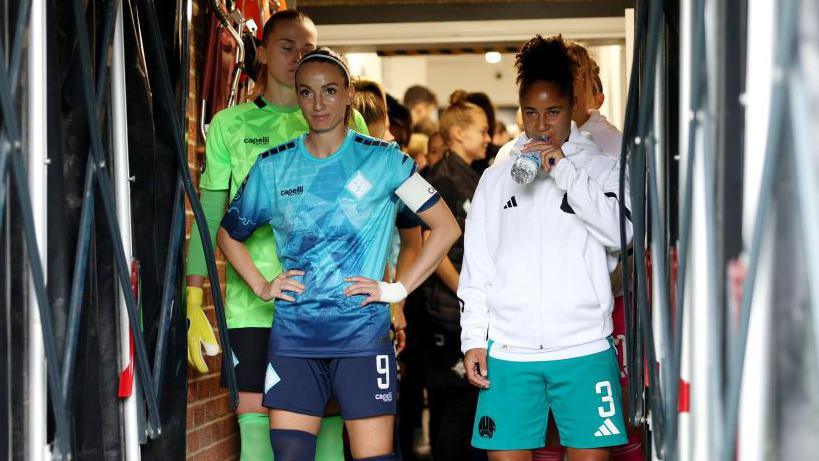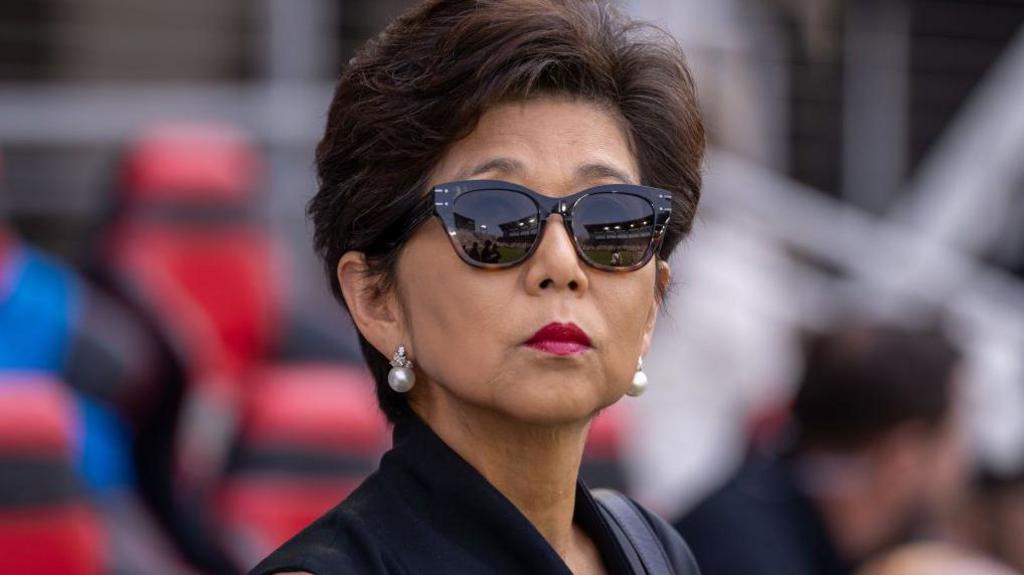Is this the future of the Women's Championship?

Sweden captain Kosovare Asllani (left) and England's Euro 2022 winner Demi Stokes (right) captained London City Lionesses and Newcastle respectively
- Published
It is not often you hear someone has arrived for a Women’s Championship match in a private jet but London City Lionesses owner Michele Kang was not going to miss this match.
Having been in Washington DC for last night’s National Women’s Soccer League game between Washington Spirit and Portland Thorns, Kang carried the glamour with her back to Bromley.
It was London City Lionesses’ season opener against Newcastle United and there was a Hollywood feel between two of the league’s most intriguing, ambitious and top-spending clubs.
There was a large fan zone outside, a street dance act at half-time, sausage dogs in the stands and sponsorship boards painted around a newly laid, state-of-the-art pitch.
It is not what we are used to seeing in the Women’s Championship.
This was the tip of the iceberg – while others in the league struggle to meet full-time wages and provide basic resources, these clubs are building foundations to hopefully become two of England’s most successful women’s teams.
Businesswoman Kang – owner of European giants Lyon, as well as Washington Spirit and London City Lionesses – was not alone in a hospitality box full of the game’s biggest names in England.
There were a number of board members from the Women’s Professional Leagues Limited (WPLL) – the new takeover company of the Women’s Super League and Women’s Championship - in attendance.
Among them was WPLL chief executive officer (CEO) Nikki Doucet and board chair Dawn Airey, as well as London City Lionesses’ chairman Jonathan Hill and managing director Sarah Batters.
They all looked on as both sides were led out by big-name internationals – Sweden captain Kosovare Asllani wearing the armband for the hosts and England defender Demi Stokes. The former got her name on the scoresheet in the first half while Stokes was making her debut for the visitors. The sides drew 1-1.

London City Lionesses owner Michele Kang flew in from Washington DC on a private jet
Just 24 hours previously, London City Lionesses had broken the Women’s Championship transfer record when they signed forward Izzy Goodwin from Sheffield United for a six-figure fee and she may not be the last arrival as the club try to make room in their squad for Sweden’s Sofia Jakobsson.
"It’s a woman investing and believing in a project with her whole heart – as much as we believe in it," said Asllani.
"We’re in the beginning of building something. I feel it’s something special.
"She [Kang] understands what we need and will give us everything we need to create a successful team. I think that’s the coolest part, that it’s a woman investing.
"I want to help her achieve this dream [and hope that we] will be successful."
Not all the stands were open and Newcastle fans outnumbered those supporting the hosts - but London City know this is a business model that will take time.
They have invested in the team with a belief that success will attract attention. Next up is ensuring the club’s new training centre is elite, then they hope to build a fanbase from scratch in Bromley.
They got off to a good start with a new club league record attendance of 1,781 against Newcastle.
But while it remains a work in progress, it is clear these clubs are ambitious and have shown a potential future for the women’s second tier.
Their growth coincides with a major turning point in women’s football as the WPLL aim to attract new investment in England’s top two tiers, which they hope will encourage others to follow suit with Kang’s ownership model.
"As I told my players, it's not a new chapter, it's a new book that we are writing," said London City manager Jocelyn Precheur.
"We have everything to build, we have fans to seduce and convince to follow us, a history to create - so it was the first page of the new story.
"It could have been better, it could have been worse, but anyway, the first match is done and I hope the journey will be long and beautiful."